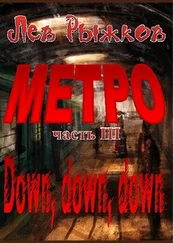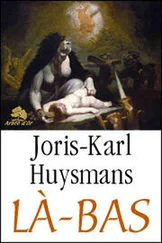Joris-Karl Huysmans - Down There (Là-Bas)
Здесь есть возможность читать онлайн «Joris-Karl Huysmans - Down There (Là-Bas)» весь текст электронной книги совершенно бесплатно (целиком полную версию без сокращений). В некоторых случаях можно слушать аудио, скачать через торрент в формате fb2 и присутствует краткое содержание. Жанр: Классическая проза, на английском языке. Описание произведения, (предисловие) а так же отзывы посетителей доступны на портале библиотеки ЛибКат.
- Название:Down There (Là-Bas)
- Автор:
- Жанр:
- Год:неизвестен
- ISBN:нет данных
- Рейтинг книги:3 / 5. Голосов: 1
-
Избранное:Добавить в избранное
- Отзывы:
-
Ваша оценка:
- 60
- 1
- 2
- 3
- 4
- 5
Down There (Là-Bas): краткое содержание, описание и аннотация
Предлагаем к чтению аннотацию, описание, краткое содержание или предисловие (зависит от того, что написал сам автор книги «Down There (Là-Bas)»). Если вы не нашли необходимую информацию о книге — напишите в комментариях, мы постараемся отыскать её.
Down There (Là-Bas) — читать онлайн бесплатно полную книгу (весь текст) целиком
Ниже представлен текст книги, разбитый по страницам. Система сохранения места последней прочитанной страницы, позволяет с удобством читать онлайн бесплатно книгу «Down There (Là-Bas)», без необходимости каждый раз заново искать на чём Вы остановились. Поставьте закладку, и сможете в любой момент перейти на страницу, на которой закончили чтение.
Интервал:
Закладка:
"Then he becomes weary of these fecal joys. An unpublished passage in his trial proceedings informs us that 'The said sire heated himself with little boys, sometimes also with little girls, with whom he had congress in the belly, saying that he had more pleasure and less pain than acting in nature.' After which, he slowly saws their throats, cuts them to pieces, and the corpses, the linen and the clothing, are put in the fireplace, where a smudge fire of logs and leaves is burning, and the ashes are thrown into the latrine, or scattered to the winds from the top of a tower, or buried in the moats and mounds.
"Soon his furies become aggravated. Until now he has appeased the rage of his senses with living or moribund beings. He wearies of stuprating palpitant flesh and becomes a lover of the dead. A passionate artist, he kisses, with cries of enthusiasm, the well-made limbs of his victims. He establishes sepulchral beauty contests, and whichever of the truncated heads receives the prize he raises by the hair and passionately kisses the cold lips.
"Vampirism satisfies him for months. He pollutes dead children, appeasing the fever of his desires in the blood smeared chill of the tomb. He even goes so far-one day when his supply of children is exhausted-as to disembowel a pregnant woman and sport with the fœtus. After these excesses he falls into horrible states of coma, similar to those heavy lethargies which overpowered Sergeant Bertrand after his violations of the grave. But if that leaden sleep is one of the known phases of ordinary vampirism, if Gilles de Rais was merely a sexual pervert, we must admit that he distinguished himself from the most delirious sadists, the most exquisite virtuosi in pain and murder, by a detail which seems extrahuman, it is so horrible.
"As these terrifying atrocities, these monstrous outrages, no longer suffice him, he corrodes them with the essence of a rare sin. It is no longer the resolute, sagacious cruelty of the wild beast playing with the body of a victim. His ferocity does not remain merely carnal; it becomes spiritual. He wishes to make the child suffer both in body and soul. By a thoroughly Satanic cheat he deceives gratitude, dupes affection, and desecrates love. At a leap he passes the bounds of human infamy and lands plump in the darkest depth of Evil.
"He contrives this: One of the unfortunate children is brought into his chamber, and hanged, by Bricqueville, Prelati, and de Sillé, to a hook fixed into the wall. Just at the moment when the child is suffocating, Gilles orders him to be taken down and the rope untied. With some precaution, he takes the child on his knees, revives him, caresses him, rocks him, dries his tears, and pointing to the accomplices, says, 'These men are bad, but you see they obey me. Do not be afraid. I will save your life and take you back to your mother,' and while the little one, wild with joy, kisses him and at that moment loves him, Gilles gently makes an incision in the back of the neck, rendering the child 'languishing,' to follow Gilles's own expression, and when the head, not quite detached, bows, Gilles kneads the body, turns it about, and violates it, bellowing.
"After these abominable pastimes he may well believe that the art of the charnalist has beneath his fingers expressed its last drop of pus, and in a vaunting cry he says to his troop of parasites, "There is no man on earth who dare do as I have done.'
"But if in Love and Well-doing the infinite is approachable for certain souls, the out-of-the-world possibilities of Evil are limited. In his excesses of stupration and murder the Marshal cannot go beyond a fixed point. In vain he may dream of unique violations, of more ingenious slow tortures, but human imagination has a limit and he has already reached it-even passed it, with diabolic aid. Insatiable he seethes-there is nothing material in which to express his ideal. He can verify that axiom of demonographers, that the Evil One dupes all persons who give themselves, or are willing to give themselves, to him.
"As he can descend no further, he tries returning on the way by which he has come, but now remorse overtakes him, overwhelms him, and wrenches him without respite. His nights are nights of expiation. Besieged by phantoms, he howls like a wounded beast. He is found rushing along the solitary corridors of the château. He weeps, throws himself on his knees, swears to God that he will do penance. He promises to found pious institutions. He does establish, at Mâchecoul, a boys' academy in honour of the Holy Innocents. He speaks of shutting himself up in a cloister, of going to Jerusalem, begging his bread on the way.
"But in this fickle and aberrated mind ideas superpose themselves on each other, then pass away, and those which disappear leave their shadow on those which follow. Abruptly, even while weeping with distress, he precipitates himself into new debauches and, raving with delirium, hurls himself upon the child brought to him, gouges out the eyes, runs his finger around the bloody, milky socket, then he seizes a spiked club and crushes the skull. And while the gurgling blood runs over him, he stands, smeared with spattered brains, and grinds his teeth and laughs. Like a hunted beast he flees into the wood, while his henchmen remove the crimson stains from the ground and dispose prudently of the corpse and the reeking garments.
"He wanders in the forests surrounding Tiffauges, dark, impenetrable forests like those which Brittany still can show at Carnoet. He sobs as he walks along. He attempts to thrust aside the phantoms which accost him. Then he looks about him and beholds obscenity in the shapes of the aged trees. It seems that nature perverts itself before him, that his very presence depraves it. For the first time he understands the motionless lubricity of trees. He discovers priapi in the branches.
"Here a tree appears to him as a living being, standing on its root-tressed head, its limbs waving in the air and spread wide apart, subdivided and re-subdivided into haunches, which again are divided and re-subdivided. Here between two limbs another branch is jammed, in a stationary fornication which is reproduced in diminished scale from bough to twig to the top of the tree. There it seems the trunk is a phallus which mounts and disappears into a skirt of leaves or which, on the contrary, issues from a green clout and plunges into the glossy belly of the earth.
"Frightful images rise before him. He sees the skin of little boys, the lucid white skin, vellum-like, in the pale, smooth bark of the slender beeches. He recognizes the pachydermatous skin of the beggar boys in the dark and wrinkled envelope of the old oaks. Beside the bifurcations of the branches there are yawning holes, puckered orifices in the bark, simulating emunctoria, or the protruding anus of a beast. In the joints of the branches there are other visions, elbows, armpits furred with grey lichens. Even in the trunks there are incisions which spread out into great lips beneath tufts of brown, velvety moss.
"Everywhere obscene forms rise from the ground and spring, disordered, into a firmament which satanizes. The clouds swell into breasts, divide into buttocks, bulge as if with fecundity, scattering a train of spawn through space. They accord with the sombre bulging of the foliage, in which now there are only images of giant or dwarf hips, feminine triangles, great V's, mouths of Sodom, glowing cicatrices, humid vents. This landscape of abomination changes. Gilles now sees on the trunks frightful cancers and horrible wens. He observes exostoses and ulcers, membranous sores, tubercular chancres, atrocious caries. It is an arboreal lazaret, a venereal clinic.
"And there, at a detour of the forest aisle, stands a mottled red beech.
"Amid the sanguinary falling leaves he feels that he has been spattered by a shower of blood. He goes into a rage. He conceives the delusion that beneath the bark lives a wood nymph, and he would feel with his hands the palpitant flesh of the goddess, he would trucidate the Dryad, violate her in a place unknown to the follies of men.
Читать дальшеИнтервал:
Закладка:
Похожие книги на «Down There (Là-Bas)»
Представляем Вашему вниманию похожие книги на «Down There (Là-Bas)» списком для выбора. Мы отобрали схожую по названию и смыслу литературу в надежде предоставить читателям больше вариантов отыскать новые, интересные, ещё непрочитанные произведения.
Обсуждение, отзывы о книге «Down There (Là-Bas)» и просто собственные мнения читателей. Оставьте ваши комментарии, напишите, что Вы думаете о произведении, его смысле или главных героях. Укажите что конкретно понравилось, а что нет, и почему Вы так считаете.












